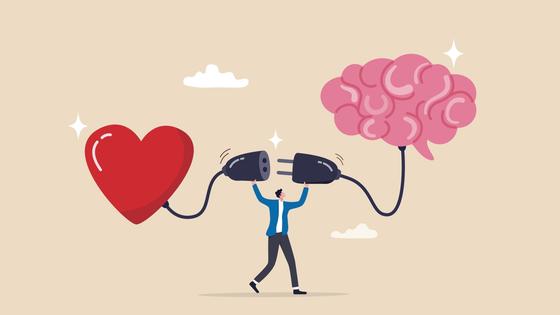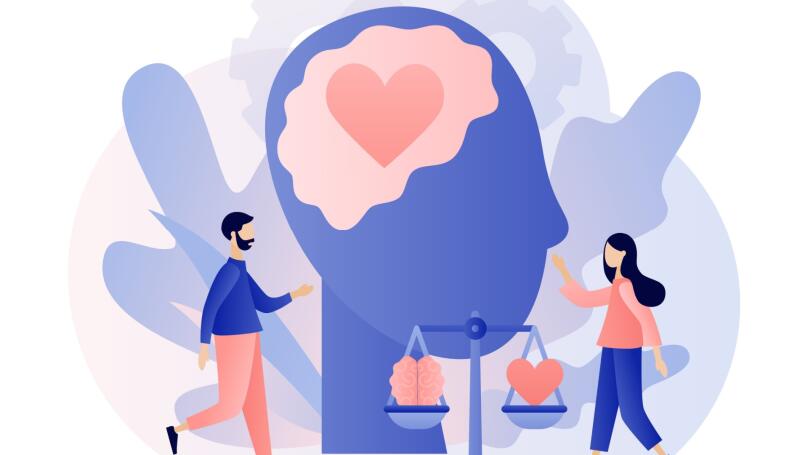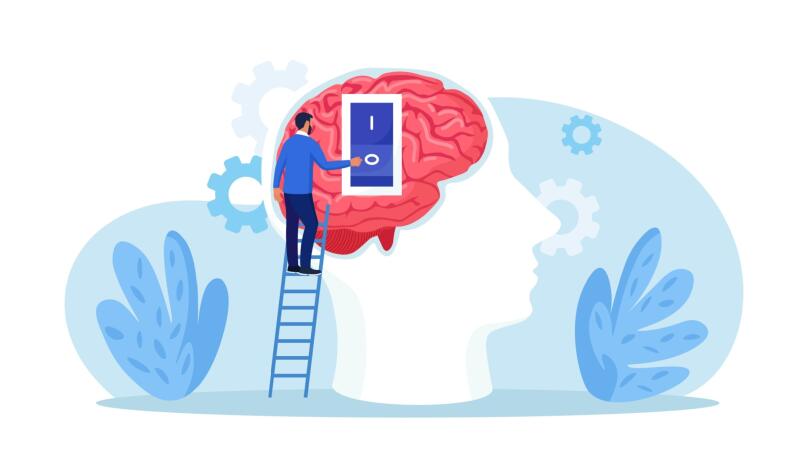How Emotional Intelligence Impacts Success and Why Your Career Depends Upon It
The modern world continues to evolve rapidly, and emotional Intelligence plays an increasingly important role in it.

"The ability to manage your own emotions and interact competently with others is much more significant than hard skills and IQ," world experts and career coaches boldly declare. Let's find out why emotional Intelligence is vital in personal and professional life, how it affects success, and what you can do to develop EQ.
Emotional Intelligence: Everything You Must Know

Emotional intelligence, or emotional quotient (EQ), is the ability to correctly recognise and interpret one's own emotions, as well as to understand the true desires, intentions, and motivations of others. In addition, EQ implies a competent response to manifesting and managing emotions. Producer Robert Cooper calls emotional intelligence "the ability to sense, understand, and deliberately harness the power of emotion as a source of energy, information, and influence."
I'm sure you will agree that a high mental Intelligence, i.e., IQ, is sometimes not enough to successfully interact with the people around you, achieve your goals and live in harmony with yourself. For this, it is necessary to have high EQ or emotional intelligence. It refers to the so-called soft skills - supra professional skills that allow you to communicate effectively with colleagues and people around you, build healthy relationships, successfully negotiate and achieve goals, learn quickly and adapt to changing conditions.
There are several components of emotional intelligence:
- Self-awareness, or accepting your emotions, skilfully and accurately identifies an emotion, the reason for its occurrence and its impact on your well-being.
- Empathy, or perceiving the emotions of others, is the ability to understand what another person is experiencing and share those feelings. It also includes listening to and hearing others, perceiving emotional cues, showing empathy and providing necessary support.
- Expression of emotions is the ability not to hide one's feelings, but to express them most ecologically while considering the emotions of others. Furthermore, it is the ability to ask for sympathy and support, to build healthy relationships with others and, as a result, to achieve harmony both externally and internally.
- Managing one's and others' emotions is the ability to control the manifestation of emotions, cope with stress, adapt to changing conditions, and make constructive and balanced decisions. Only after you learn to manage your emotions will you be able to regulate the manifestation of feelings of other people, to cause them certain emotions or, on the contrary, to prevent emotional outbursts and impulsive decisions.
Thus, a person with developed emotional Intelligence can react most reasonably to negative situations and the reasons for their occurrence, objectively perceive criticism, understand other people and give them the necessary feedback. Psychologist, science journalist and author of the book "Emotional Intelligence" Daniel Goleman states that people with high EQ have a more pronounced tendency to leadership. Additionally, they have psychological stability and a high level of efficiency.
How Emotional Intelligence Can Affect Your Career

According to a study conducted by the international consulting company Egon Zehnder, people with developed emotional intelligence have a much better chance of success in professional activities. Specialists of the Carnegie Research Institute of America also believe that about 85% of success is associated with high emotional intelligence, developed leadership skills and communication skills. Accordingly, only 15% of success depends on professional competencies and specialised knowledge.
Psychologist Daniel Goleman states: "People with high IQ but low EQ turn into stereotypical nerds: critical, condescending, withdrawn, unable to express their feelings. Conversely, those who develop their emotional intelligence become balanced, sociable, loyal, caring, with a rich but moderate emotional life - they are comfortable with themselves, others, and the society in which they live." However, it is essential to strike a balance and develop flexible human skills related to emotional intelligence, i.e., soft skills and professional competencies. This combination of skills is an absolute must-have for any professional in today's world!
Nevertheless, emotional intelligence significantly impacts success because it is directly related to the most important factors of building a stable and prosperous career, namely:
- Leadership skills are the ability to manage one's and other people's emotions, control them, and regulate and direct them in the right direction, making specialists effective workers and authentic leaders who can lead, inspire, and motivate the team.
- Communication skills. High emotional intelligence allows establishing a trustful connection with colleagues, management, partners, and clients. The skill of correctly reading and interpreting other people's emotions and understanding their actual wants and needs contributes to effective communication and prompt resolution of conflicts.
- The ability to interact with the environment and interpersonal skills. People with developed emotional intelligence easily find a common language with new colleagues, supervisors or subordinates, and people of other professions and spheres of interest. They can work effectively in a team, provide support, show empathy, and motivate other working group members, thus contributing to maintaining a healthy psychological climate in the working environment.
- Stress tolerance. Emotional intelligence helps to cope with stressful situations and their negative consequences, react objectively to criticism, adapt quickly to change, and make rational, balanced decisions in ambiguous circumstances.
- Decision-making skills. Analysing emotional aspects is particularly important in making more considered, constructive decisions.
- Self-cultivation. Developed emotional intelligence implies honesty with oneself, constant reflection, evaluation of one's behaviour and, accordingly, the process of self-improvement. In our rapidly evolving world, this is one of the most essential skills - flexibility and following the trend of lifelong learning.
Harvard University scientists also attribute decisive importance to emotional intelligence in professional self-actualisation. However, according to a study by Passive Secrets, only 36% of people worldwide have high EQ, even though emotional abilities are many times more critical than IQ in achieving success and building a prestigious career. As American entrepreneur Jack Welch said: "No doubt emotional intelligence is more rare than book smarts, but my experience says it is actually more important in the making of a leader. You just can't ignore it."
Lectera’s Online Courses by topic
How to Level-Up Emotional Intelligence: The Most Effective Tips

The basis for developing emotional intelligence is awareness and self-control. In other words, you should start boosting your EQ by realising what is happening to you, what emotions you experience at certain times, what they are caused by and how to deal with them. To do this, you must learn to see yourself from the outside and evaluate emotions separately from your personality. Self-control, in turn, means the ability to express your emotions but not to engage in emotional battles, competently formulate the original source of your feelings and, on this basis, to make an informed decision.
Here are some of the most effective tips for developing your emotional intelligence:
- Practice mindfulness.
This concept refers primarily to a psychological process aimed at deep awareness of events that are happening now. In other words, it is the ability to perceive the environment and your inner state, namely the feelings, emotions, and desires you are currently experiencing. To develop mindfulness, you should ask yourself regularly: "How am I feeling right now?" Not only is the answer critical, but also the fact that you are aware of your state. Try to answer yourself honestly and accept your experiences. Moreover, honesty is one of the most essential conditions for finding harmony within yourself and the world around you.
- Develop empathy and keep a "Diary of Emotions."
Keep a "Diary of Emotions" to remember to focus on your emotions, thoughts, and feelings. Every time you notice you are consumed by irritation, resentment, insecurity, jealousy, or adoration - in a word, the most different, even barely noticeable shades of emotion - record them on paper. Describe your state in as much detail as possible and compare it with the feelings you have already experienced. Also, think about what caused this emotion and why you reacted this way. Ensure you pay attention to the physical manifestation of the emotion, such as clenched jaws in moments of anger or tremors in your hands when you feel fear. Describe how long the feeling lasted and what else accompanied it. It will help you reacquaint yourself with yourself and get to know yourself better. In addition, only in this way will you learn to recognise your emotions in time, control them and not give in to external provocations.
- Give yourself a timeout.
The exercise "Pause before reacting" aims to develop control and manage emotions. Before reacting to any event, incident, or critical statement, give yourself at least a few seconds to think and reflect on this reaction. It will help you avoid impulsive actions that you will regret later. Always think about what you are doing, even if it is just a response, before you do it.
- Remember to meditate.
First, meditation aims to find peace of mind and restore internal resources. So, during meditation, the brain rests because it does not process vast arrays of information. It lets you stop the endless pursuit of deadlines and "catch your breath". The key is to abstract yourself from the outside world and focus on your inner feelings and thoughts. The best way to start meditating is to practice mindful breathing. To do this, sit comfortably, straighten your back, and put your feet flat. Switching off your phone in advance and ensuring nothing disturbs you is better. Only then do you close your eyes and concentrate on your breathing. Breathe in and out slowly. After a few seconds, you will think or dream about something. Now, the main thing is to restrain the impulse not to fall into memories and again be able to focus on your breathing.
- Practise "active listening."
Active listening suggests listening attentively to the interlocutor, perceiving information and actively participating in the dialogue, asking counter questions, and supporting the flow of the conversation. It helps to improve the relationship between interlocutors, increase the level of trust between them and even prevent conflicts. People who practice active listening turn out to be very interesting and empathic interlocutors with whom it is pleasant and valuable to communicate. Therefore, try not to be distracted by phone notifications and extraneous thoughts during the conversation, do not interrupt the speaker, nod periodically, look them in the eyes, ask questions that interest you and clarify unclear information. Also, if you have something to add, tell a little about your experience. In this case, active listening will bear fruit and strengthen the relationship between you and your interlocutor.
- Don't be afraid of getting feedback.
To understand what skills you lack and what your weaknesses and strengths are, you need to get an outside opinion. Ask your friends, colleagues, or supervisor to give you feedback. Ask them what kind of person they see you as: maybe irascible, unrestrained, malleable, or even unemotional. It's also a good idea to find out how your emotional reactions affect the people around you. Make up a pool of questions you should ask those around you, then conclude what you lack and what skills you must level up first.
Emotional intelligence is a critical component of a successful career and professional fulfilment. The awareness of your feelings and the emotions of others will allow you to look at various situations objectively and react competently to them, draw the right conclusions, make constructive decisions, and thus increase your productivity. Remember that success is in your hands, or rather in yourself! Therefore, do not neglect the advice you have learnt today. Try to implement at least some of the proposed practices, and you will yield the first results soon.
Share this with your friends via:
Latest News

A significant stage in the development of the alternative education system has begun in West Northamptonshire in the UK: the County Council is actively calling on parents, guardians, and trustees to participate in shaping the future of this key area.

Outwoods Primary School in Atherstone, Warwickshire, having experienced deep sadness after the loss of their famous cat, Silla, has found solace in a new pet – a Maine Coon named Aloysius O’Hara.

In modern universities, artificial intelligence, and in particular ChatGPT, is rapidly transforming from a controversial tool into a full-fledged student assistant.

An innovative educational project is gaining momentum in UK primary schools, aiming to change attitudes towards video games.

The Massachusetts Institute of Technology (MIT) presents MIT Learn – a revolutionary online platform that opens a “new front door” to access university knowledge and resources.












 Test. Check Your Social Media Dependency Level!
Test. Check Your Social Media Dependency Level!
 Test: What Business is Right For You?
Test: What Business is Right For You?
 “I’m Here for the Long Haul”: When Loyalty to a Company Becomes Toxic
“I’m Here for the Long Haul”: When Loyalty to a Company Becomes Toxic
 Test: How Prone Are You to Abusive Behavior as a Manager?
Test: How Prone Are You to Abusive Behavior as a Manager?
 Test. What superpower would you possess if you were a superhero?
Test. What superpower would you possess if you were a superhero?
 Test. What Should You Let Go of Before Winter Ends?
Test. What Should You Let Go of Before Winter Ends?
